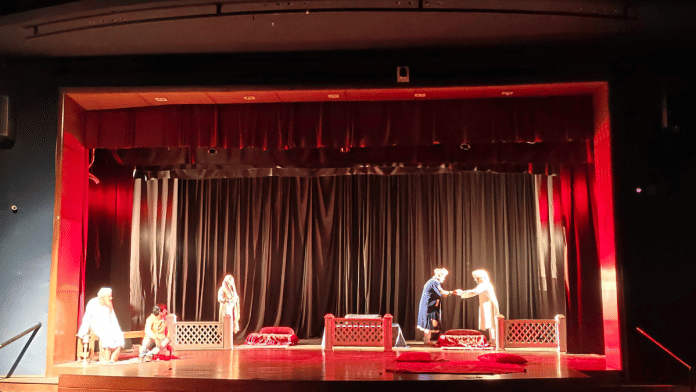New Delhi: Mughal emperor Aurangzeb appears as a barbaric, bloodthirsty religious fanatic in popular discourse and creative works. His name is used as a derogatory term not just for Muslims, but anyone who questions this version of history. In M Sayeed Alam’s play Sons of Babur, however, Aurangzeb—played by Tanul Bhartiya—is a remorseful old man who spends his days in penance.
The New Delhi-based theatre group, Pierrot’s Troupe stayed true to Alam’s Aurangzeb when it staged its 73rd show of Sons of Babur at Mandi House on 13 July. The company has performed it all over India as well as in England and Dubai.
Based on Salman Khurshid’s book Sons of Babur: A Play in Search of India (2008), and directed by Alam, the play features a surreal meeting between a history student, Rudranshu (Himanshu Srivastava), and the last Mughal emperor, Bahadur Shah Zafar (Alam).
It also dodges the well-known narrative of Aurangzeb’s cruelty in favour of a sombre ruler. Dressed in plain white robes, the 92-year-old emperor, like Shakespeare’s broken King Lear, voices his failings as a ruler in a letter to his son—a far cry from his fearsome reputation.
“Atrocities have been committed in your province for a long time: Be afraid of the curse of the downtrodden: Ah, I myself could not prove to be a good ruler and protector of my subjects!”
In a similar vein, the play delves into Shah Jahan’s (Bhartiya) usurpation of the throne instead of the romantic Taj Mahal episode associated with him. In an attempt to trace ‘how Mughals became Hindustani’, the play distils a balanced story out of the oft-repeated Mughal history.
But Alam’s Aurangzeb hasn’t gone down well with everyone.
“There have been a few comments about the play being a bit soft on Aurangzeb,” he told ThePrint.
In the play, as Rudranshu and Bahadur Shah Zafar argue about Aurangzeb’s legacy, the student mentions that the cruel emperor destroyed a lot of temples. The Mughal skirts the question, instead asserting that Aurangzeb also had a lot of temples made.
Alam accepts the criticism to a degree and feels that some revisions are required.
“Even in today’s context, if someone demolishes a mosque and says that you may build another, that’s not justified, is it? If it has been demolished, punish the act first and then get another Mosque built.”
Accuracy vs creative freedom
The show started out immersive, with characters emerging from the audience and walking around seats as they delivered their lines. The hall served as a stage-beneath-the-stage – representing the modern era – populated by some students and a professor of history, Anju Chhabra.
A corner of the stage, occupied throughout by Rudranshu and Bahadur Shah Zafar, represented the late 1860s when the last Mughal emperor was exiled by the British to Rangoon (now Yangon). The centre stage was where the story played out, from Babur (Bilal Mir) to Aurangzeb.
The merging of different eras in the play is a deliberate choice: Bahadur Shah Zafar was not only the last Mughal emperor but was also crowned by Indian rebels as the ‘Emperor of India’ during the Revolt of 1857. By centring the narrative around the emperor, Khurshid asserts the centrality of the Mughals to independent India.
Clearly, the narrative has more serious concerns than merely the dramatic. So, it had to be rooted in historical events. But that doesn’t mean it doesn’t take some creative liberties.
For instance, Jodha Bai (Alina Zulfiqar)—whose existence historians can’t seem to agree upon—speaks in Sanskritised Hindi instead of a dialect closer to Rajasthani. The emperors refer to themselves as ‘Mughals’ and not Timurids, the term preferred by Babur.
This doesn’t necessarily take away from the narrative—sometimes, facts have to be sacrificed at the altar of art. But the Sankritisation of Rajasthani perhaps warrants thinking because language appears as an important facet of identity in the play. Rudranshu’s use of the Farsi word mast (great) is taken by Bahadur Shah Zafar as a sign of the Mughals’ immersion into the Indian social fabric.
Incidentally, the language in which the play is written, Hindustani, also harkens back to its central theme of Indianness.
Also read: Sambar did not originate in South India. It was first cooked in a royal Maratha kitchen
Slip-ups
Alam’s characterisation of the ageing, powerless Bahadur Shah Zafar, who nonetheless retains a sharp tongue and a firm grasp of his ancestral history, captivated the audience. His attempts at repeating Rudranshu’s Bengali-accented words had everyone in splits. His dramatic exit through the audience—an old man’s shuffling gait as he returns to his place in history—left the audience pensive.
Alam’s character grounded the play and he held the reins of the production. When some backstage fumbles delayed the entry of Bairam Khan (Satyam Jha)—perhaps the heavy chains he donned as a prisoner on trial—Alam took control, narrating to Rudranshu (and the audience) the highly dramatic events that were about to unfold.
A similar delay happened later with Aurangzeb’s entry, at which point Alam’s improvised introduction of the last Mughal emperor turned into Bahadur Shah Zafar’s agonising, pitiful call to his ancestor.
While his efforts added layers to the story, Alam takes ‘goof-ups’ very seriously. To him, on-stage fumbles are simply unacceptable.
“In theatre, no margin of error can exist. God is allowed to make mistakes, but not a theatre artist.”
(Edited by Aamaan Alam Khan)






